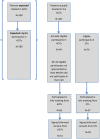Overcoming recruitment barriers revealed high readiness to participate and low dropout rate among people with schizophrenia in a randomized controlled trial testing the effect of a Guided Self-Determination intervention
- PMID: 24490977
- PMCID: PMC3927263
- DOI: 10.1186/1471-244X-14-28
Overcoming recruitment barriers revealed high readiness to participate and low dropout rate among people with schizophrenia in a randomized controlled trial testing the effect of a Guided Self-Determination intervention
Abstract
Background: Recruitment is one of the most serious challenges in performing randomized controlled trials. Often clinical trials with participants diagnosed with schizophrenia are terminated prematurely because of recruitment challenges resulting in a considerable waste of resources in the form of time, funding, and the participants' efforts. Dropout rates in schizophrenia trials are also high.Recruitment challenges are often due to patients not wanting to participate in research but can also be due to clinicians' concerns regarding individuals diagnosed with schizophrenia as participants in research. This paper reports how overcoming recruitment challenges not related to patients revealed high readiness to take part and low dropout rates in a one year long randomized controlled trial testing Guided Self-Determination (GSD) among outpatients with schizophrenia receiving treatment in Assertive Outreach Teams in the northern part of Denmark.
Methods: GSD is a shared decision-making and mutual problem-solving method using reflection sheets, which was developed in diabetes care and adjusted for this study and utilized by patients with schizophrenia. Descriptive data on strategies to overcome recruitment challenges were derived from notes and observations made during the randomized controlled trial testing of GSD in six outpatient teams.
Results: Three types of recruitment challenges not related to patients were identified and met during the trial: 1) organizational challenges, 2) challenges with finding eligible participants and 3) challenges with having professionals invite patients to participate. These challenges were overcome through: 1) extension of time, 2) expansion of the clinical recruitment area and 3) encouragement of professionals to invite patients to the study. Through overcoming these challenges, we identified a remarkably high patient-readiness to take part (101 of 120 asked accepted) and a low dropout rate (8%).
Conclusion: Distinction between recruitment challenges was important in discovering the readiness among patients with schizophrenia to take part in and complete a trial with the GSD-intervention.
Figures



References
-
- de Salis I, Tomlin Z, Toerien M, Donovan J. Using qualitative research methods to improve recruitment to randomized controlled trials: the Quartet study. J Health Serv Res Policy. 2008;13(Suppl 3):92–96. - PubMed
-
- Ross S, Grant A, Counsell C, Gillespie W, Russell I, Prescott R. Barriers to participation in randomised controlled trials: a systematic review. J Clin Epidemiol. 1999;52(12):1143–1156. - PubMed
-
- Gilbody S, Wahlbeck K, Adams C. et al.Randomized controlled trials in schizophrenia: a critical perspective on the literature. Acta Psychiatr Scand. 2002;105:243–251. - PubMed
Publication types
MeSH terms
LinkOut - more resources
Full Text Sources
Other Literature Sources
Medical
Miscellaneous

